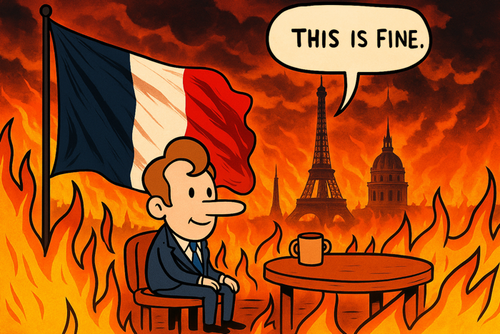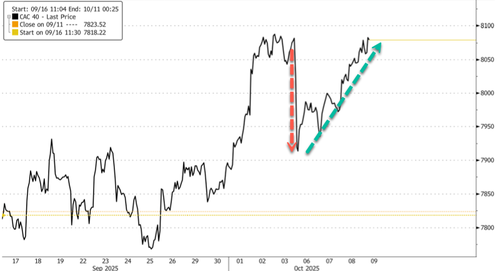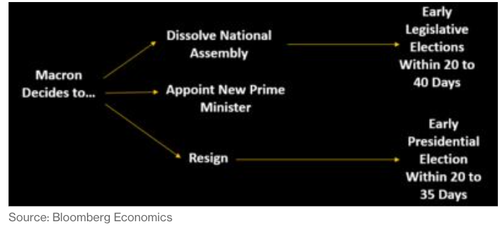What a wild week it’s been for French politics. Let’s dive right into the latest development: overnight news that President Emmanuel Macron will appoint a new prime minister by Friday evening, avoiding (for now) a snap election that could spark even more political turmoil.

UBS analyst Aditi Samajpati updated clients with the latest:
French President Emmanuel Macron will reportedly name a new prime minister by Friday evening, having avoided the need to call a snap election for the time being. Outgoing Premier Sebastien Lecornu told local television that sufficient progress had been made to allow work to begin on forming a new cabinet along with possibilities for a compromise in parliament.
The new PM will face significant challenges, including forming a cabinet and navigating a split parliament with three deeply antagonistic blocs, as well as the looming 2027 presidential election.
Lecornu, who resigned after less than a month in office, expects a new premier to be named rather than early legislative elections or Macron’s resignation to resolve the crisis. He emphasized that the prospects for snap legislative elections had “receded” and insisted that Macron should serve out his mandate until 2027, adding, “Let’s not make the French believe that it’s the president who votes the budget.”
There’s no indication yet on who could be the new premier – unless Lecornu is reappointed, his successor will be the eighth PM of Macron’s presidency since 2017. Lecornu suggested that a more technocratic government could be named, with people in the new cabinet not having “ambitions” to stand in the 2027 presidential elections. He highlighted the need for a team that decides to “roll up its sleeves and solve the country’s problems until the presidential election.”
Macron’s path forward for any new administration is fraught with hazards, given that parliament is deeply divided among three parties with no interest in compromising, and each is highly focused on positioning itself for the presidential election in less than two years. Meanwhile, National Rally leader Marine Le Pen, a leading contender for 2027, has vowed to censure any government backed by Macron in an effort to force fresh elections.
UBS analyst Simon Penn noted:
The bigger concern now is how long this goes on for. Most of the conversation late Wednesday wasn’t actually about who would be the new PM, but rather that the rinse/repeat continues until 2027 and the presidential election. In other words, French politics and parliament is essentially in a holding pattern until Macron is required to ask the country the big question on the political slant of its next president.
Despite the turmoil, French 10-year yields fell five basis points to 3.51% on today’s news, while the CAC 40 has nearly erased its losses from earlier in the week.

Reporting from earlier in the week:
Important.
The crisis in France is about 3 things: (i) a political center that’s desperately trying to keep right-wing populism out of gov’t; (ii) broken Euro zone fiscal incentives that enable bad policy; (iii) a global rise in debt post-COVID. Long-term yields are up sharply everywhere… pic.twitter.com/TfIEohKE7z
— Robin Brooks (@robin_j_brooks) October 6, 2025
Earlier in the week, UBS analyst Penn provided clients with the three possible pathways for Macron to move forward:
-
He can try another technocrat type
-
He can call a general election
-
He can quit and call a full presidential election
The Bloomberg Economics team provided readers with the visualization.

So, a new Prime Minister it is, then?
And by the way, we’ll end with Macron’s imploding popularity: his approval rating tumbled to a record-low 14%, according to an Oct. 7-8 Elabe poll.
Let’s not forget elsewhere…
Over the weekend, both Czechs and Japan elected their own version of Trump, while the Macron establishment regime imploded for good
— zerohedge (@zerohedge) October 6, 2025
. . .
Loading recommendations…


